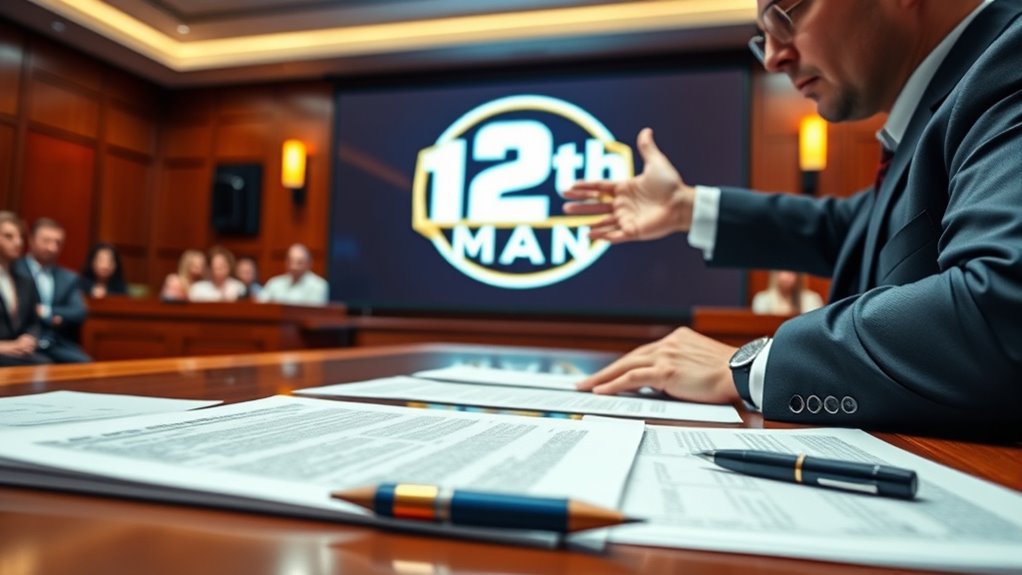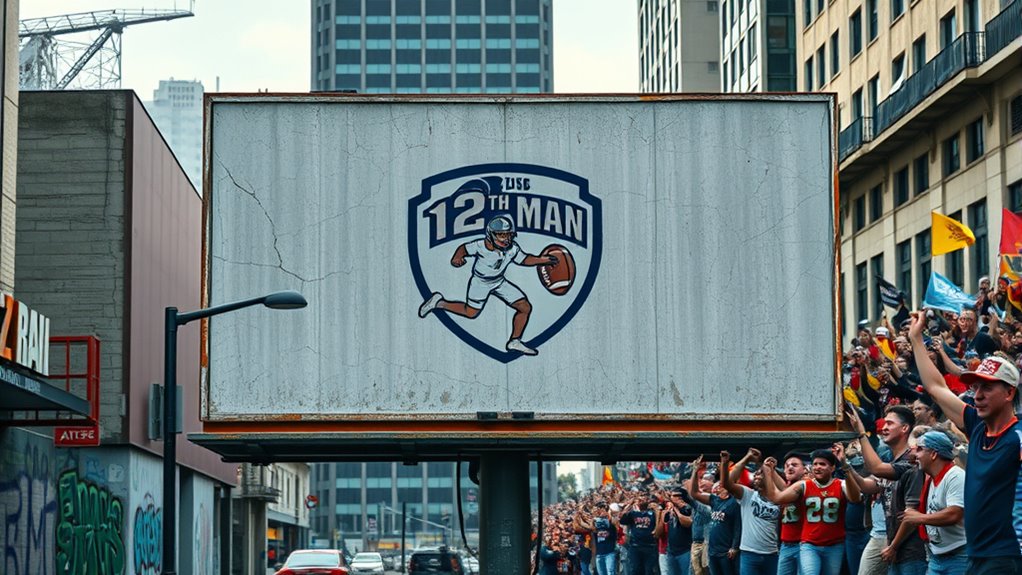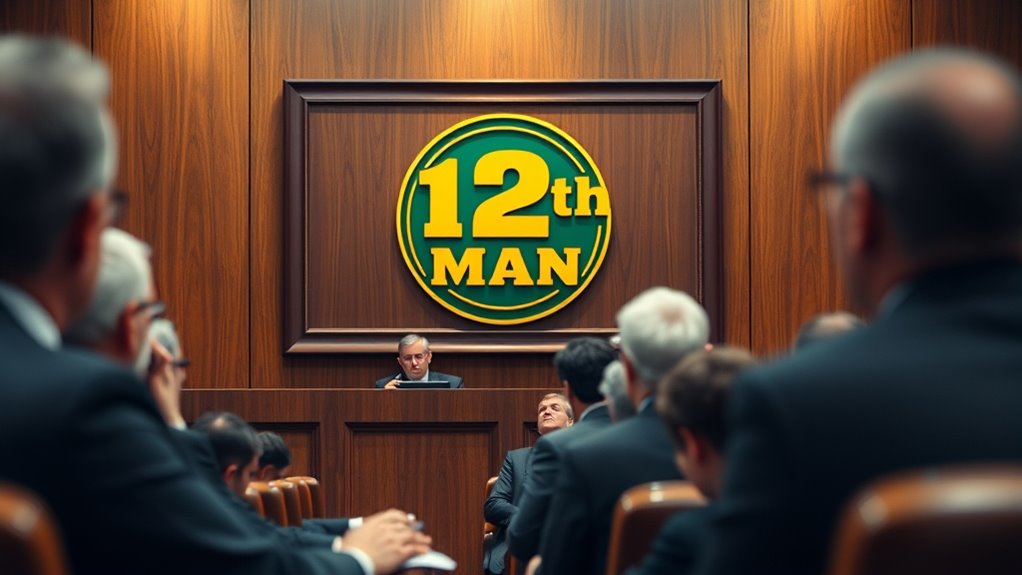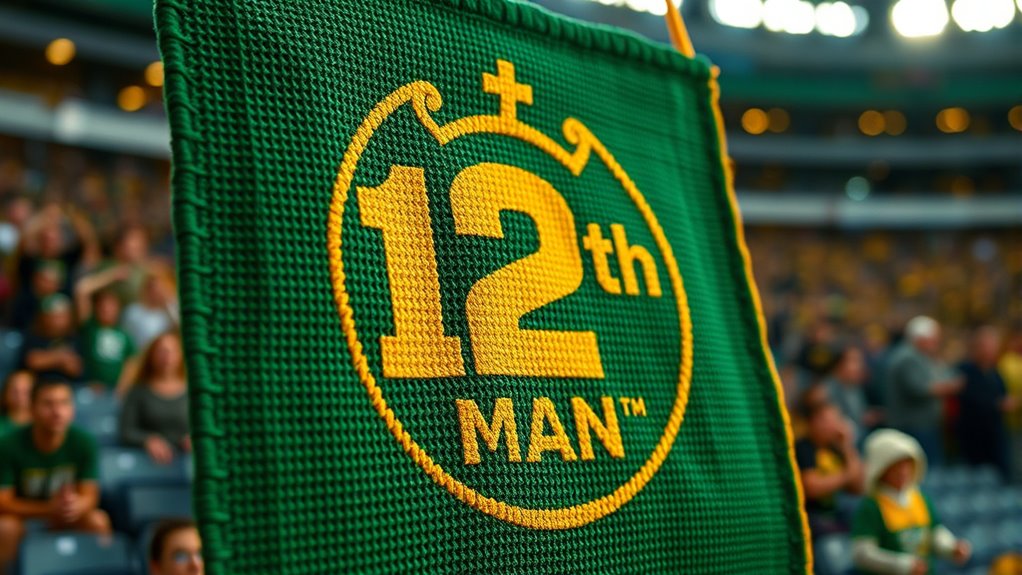The “12th Man” trademark story highlights how fans’ loyalty and community spirit inspired a powerful symbol that was legally protected through registration and enforcement. The owners faced challenges like counterfeits, unauthorized use, and legal disputes, but they successfully defended their rights through court victories and strategic measures. This process helped preserve the symbol’s cultural significance and fostered ongoing engagement. Continue exploring to discover how this emblem shaped fan culture and brand identity.
Key Takeaways
- The “12th Man” concept originated in South African sports to symbolize fan unity and team support.
- Trademark registration was pursued to protect the symbol from unauthorized commercial use.
- Legal battles reinforced ownership and prevented dilution or infringement by rivals and counterfeiters.
- The trademark has become a cultural emblem, enhancing fan identity, merchandise, and global engagement.
- Ongoing legal and branding strategies ensure the “12th Man” remains a protected and influential symbol.
Origins of the “12th Man” Concept in South African Sports

Have you ever wondered where the idea of the “12th Man” in South African sports originated? It all ties back to fan loyalty and how teams leverage branding strategies to unite supporters. Fans aren’t just spectators; they’re an essential part of the game, inspiring players and creating a vibrant atmosphere. South African teams recognized this power early, using the “12th Man” concept to symbolize the collective strength of supporters. This idea became a key branding strategy, emphasizing community and unwavering loyalty. By branding fans as the “12th Man,” teams fostered a sense of identity and pride, making supporters feel integral to the team’s success. Understanding the importance of appliance maintenance plans and consistent support can also help strengthen the overall resilience of a community. Over time, this concept helped deepen fan engagement and strengthen the emotional connection between teams and their followers.
The Legal Pursuit to Protect the Trademark Rights

As the “12th Man” concept gained popularity among fans and teams, the need to protect its unique identity became clear. You must actively defend against branding disputes that threaten unauthorized use of the trademark. Legal efforts focus on securing exclusive rights through registration, ensuring you can prevent others from misusing or diluting the brand. Licensing agreements play a vital role, allowing you to control how the “12th Man” is represented and commercialized. By establishing clear contracts, you protect your rights and maintain the trademark’s integrity. Legal action may be necessary if infringements occur, reinforcing your commitment to safeguarding the “12th Man” identity. Ultimately, these measures help preserve the trademark’s value and cultural significance within the sporting community. Trademark protection strategies are essential to adapt to evolving legal challenges and maintain exclusivity.
Challenges Faced by the “12th Man” Trademark Owners

The “12th Man” trademark owners face numerous challenges in maintaining the integrity and exclusivity of their brand. Trademark infringement remains a constant threat, as unauthorized use can dilute the brand’s value and confuse consumers. You must vigilantly monitor the marketplace for counterfeit products and unauthorized uses that threaten your rights. Licensing challenges also arise, as you navigate agreements that guarantee proper use of the trademark without overexposing it or losing control. Balancing licensing revenue while protecting the trademark’s reputation requires careful oversight and enforcement. These challenges demand ongoing effort, resources, and legal action to safeguard the “12th Man” brand from infringement and misuse, ensuring it remains a symbol of loyalty and pride for its rightful owners. Additionally, implementing brand protection strategies is essential to effectively combat infringement and uphold the trademark’s integrity.
Key Legal Battles and Their Outcomes

Legal battles over the “12th Man” trademark have shaped its current standing and reinforced its significance. These disputes tested trademark enforcement and strengthened brand recognition. One notable case involved a rival group attempting to claim rights, but the original owners successfully defended their mark. The outcomes underscored the importance of protecting trademark rights to maintain the community’s identity. Here’s a snapshot of key legal battles:
| Year | Opponent | Outcome |
|---|---|---|
| 2008 | Unauthorized Use | Trademark upheld; infringement ruled against infringers |
| 2012 | Competing Group | Trademark reinforced; rights confirmed by court |
| 2016 | Commercial Entity | Enforcement actions prevented commercial misuse |
| 2019 | Minor League Team | Trademark defended; prevented dilution |
| 2022 | Online Platform | Legal action secured brand recognition online |
These battles highlight the ongoing importance of trademark enforcement. One factor that contributed to the success of these legal actions was the clarity of the trademark’s legal protections, which are essential for safeguarding community symbols.
The Cultural Impact and Future of the “12th Man” Symbol

The “12th Man” symbol has become a powerful emblem of community pride and spirit, resonating well beyond its original sporting context. Its influence shapes fan culture by fostering a sense of belonging and collective identity. As the symbol’s popularity grows, it notably impacts merchandise branding, making it a lucrative asset for teams and marketers alike. To understand its future, consider these aspects:
- Expanding merchandise lines that capitalize on the symbol’s emotional appeal
- Leveraging digital platforms to cultivate global fan engagement
- Developing official licensing agreements to protect the symbol’s integrity
- Incorporating the “12th Man” into community outreach and charitable initiatives
Building a loyal fan base is crucial for maintaining the symbol’s cultural significance over time. These factors ensure the symbol’s relevance endures, cementing its role as a cultural icon.
Frequently Asked Questions
How Did the “12th Man” Concept Originate Internationally Before South Africa Adopted It?
You might find that the “12th Man” concept originated internationally through historical origins like British rugby and American football, where fans’ passionate support became a symbol of team strength. Cultural diffusion spread this idea worldwide, especially in sports, as fans’ cheers and energy influence gameplay. South Africa adopted this concept later, recognizing its powerful symbolism. Your understanding highlights how sports culture evolves through global influences and shared enthusiasm.
What Specific Legal Mechanisms Were Used to Register and Defend the Trademark?
Imagine guarding a treasure chest—you use legal mechanisms to keep it safe. When registering a trademark, you file with the patent office, securing exclusive rights through trademark registration. To defend it, you rely on legal enforcement, like sending cease-and-desist letters or taking legal action against infringers. These steps protect your brand’s identity, ensuring your “12th Man” remains uniquely yours, just as a vigilant guardian defends their most valuable asset.
How Has the Trademark Impacted the Commercial Use of “12th Man” Merchandise?
You see, the trademark has considerably shaped the commercial use of “12th Man” merchandise by enabling licensing agreements that control who can produce and sell items. This maintains brand exclusivity, ensuring only authorized merchandise reaches fans. As a result, it boosts revenue, prevents counterfeits, and preserves the iconic status of the “12th Man” brand, making sure that the merchandise reflects the team’s true spirit and maintains its integrity.
What Role Did Fan Communities Play in the Trademark’S Legal Battles?
Imagine a rallying cry that refuses to fade into silence—that’s what fan activism brings to trademark enforcement. Your community’s passionate support turns into a powerful force, challenging legal battles to protect the “12th Man” trademark. Fans act as guardians, wielding their voices and loyalty to defend the symbol’s integrity, proving that collective spirit can sway courtrooms and keep the tradition alive against commercial threats.
Are There Similar Trademarks in Other Countries With Comparable Cultural Significance?
You’ll find that many countries have trademarks with cultural parallels, reflecting local passions and identities. These trademarks often spark conflicts when others challenge their uniqueness or cultural significance. In some cases, trademark conflicts arise because communities strongly protect symbols that embody their heritage. Recognizing these similarities helps you understand how cultural values influence legal battles over trademarks worldwide, emphasizing the importance of respecting local traditions and identities in trademark disputes.
Conclusion
As you witness the fierce battle to protect the “12th Man” trademark, you realize it’s more than just a symbol—it’s the heartbeat of South African sports. Every legal fight, every challenge, fuels the fire of pride and passion that can’t be silenced. This isn’t just about trademarks; it’s about safeguarding a legend that unites millions and ignites the spirit of victory. The “12th Man” isn’t just a name—it’s an unstoppable force that will forever echo in history!









